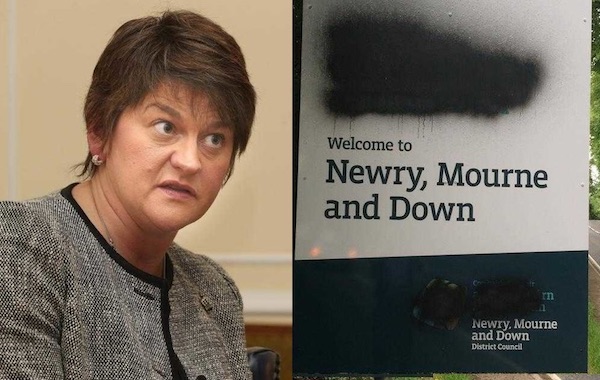
There is mounting concern that unionists in the north of Ireland are incapable of treating nationalists with respect after the DUP suddenly backed away from a deal which would have legislated for the rights for Irish language speakers.
Twelve years after the DUP first signed up to an Irish Language Act in the St Andrews Agreement, its senior members became panicked this week by the prospect of that finally coming to pass. The legislation could have meant the language becoming visible in unionist areas and would have paved the way for the return of power-sharing in the north of Ireland.
However, the arrival into Belfast of the British Prime Minister and Irish Taoiseach on Monday, amid reports that a deal was to be signed, generated a sectarian backlash among unionist extremists. On Wednesday the nonplussed DUP leader Arlene Foster announced that the talks were at an end.
Her party’s refusal to accept official status for the Irish language has become a symbol of the party’s sense of supremacy over the nationalist community, as well as its refusal to accept the ‘parity of esteem’ referred to in the 1998 Good Friday Agreement.
The DUP has also refused to countenance the prospect of marriage equality, adding to a growing conviction that the DUP may never yield on equality issues.
British Direct Ruler Karen Bradley is due to update MPs at Westminster next week, amid speculation of a possible Assembly election or a return to full Direct Rule from London. Speaking during a walkabout in Belfast on Friday, she said it had been “a difficult week” but said she believed there was still a way to restore powersharing in Belfast.
Sinn Fein president Mary Lou McDonald said ‘a draft agreement was in place’ before the DUP walked away from it. She revealed that there had actually been a compromise plan for three related pieces of legislation, on the Irish language, Ulster-Scots and cultural diversity.
However, Mrs Foster has insisted no draft agreement was in place. “I regret that we didn’t reach an agreement because they were insisting on having this free-standing Irish language act,” she said.
Both parties have refused to reveal specific details of the negotiations, insisting that confidentiality is still required because the process could e revived at some stage. No imminent attempt to restart the talks is likely.
Sinn Fein negotiator Conor Murphy said that the “good faith” that has existed during the negotiations “evaporated” with the DUP move on Wednesday.
“We had reached an accommodation, everyone involved in the process understood that, and the DUP failed to close the deal in relation to that and abruptly called a halt to proceedings,” he said.
The 26 County Minister for Foreign Affairs, Simon Coveney, said the collapse of negotiations was “hugely disappointing” and insisted there was “no appetite” for a return to full Direct Rule from London. He said he believed an “accommodation” on the key disputes was close and the parties were just hammering out how the “basket of legislation” could be presented.
“We didn’t see a final text from the two parties but we had a clear understanding of where this was going,” Mr Coveney said.
At a press conference in Belfast, the Sinn Fein leader Mary Lou McDonald said that by the end of last week the DUP and Sinn Fein had agreed a draft agreement to restore Stormont. “At that time we advised the DUP leadership that the deal should be closed before those opposed to it could unpick what we had achieved,” she said.
But the DUP leader Arlene Foster said no draft agreement was in place and that Sinn Fein “certainly didn’t have an offer of an Irish language act”.
She later said she would not agree to anything that “diminishes the Britishness of Northern Ireland” and claimed a Sinn Fein insistence on the Irish Language Act would “hold Northern Ireland to ransom”.
“I am not going to do anything that will impinge on the lives of those of us who don’t engage with the Irish language,” she said.
She accused the new Sinn Fein leader of “bullying” and “trying to put out propaganda.” She added that full Direct Rule “is always a second best option... but it is the only option at the moment.”
Former Sinn Fein leader Gerry Adams, who has remained involved in the negotiations, insisted progress had been made despite the “step back” by the DUP.
“The focus now is on getting the final bits and pieces tied down and producing an agreement that is fair and balanced, based on equality and the rights of citizens, and which creates the opportunity for more progress in the time ahead,” he said.
“In a very real sense this is the last chance agreement.”
![[Irish Republican News]](https://republican-news.org/graphics/title_gifs/rn.gif)
![[Irish Republican News]](https://republican-news.org/graphics/title_gifs/harp.gif)

